K.N. Basha, J.@mdashMr. C. Doraipandian, learned counsel for the petitioner submitted that the petitioner is the de facto complainant and witness (P.W. 1) in this case and he has come forward with this Petition seeking for the relief of cancelling the bail granted to the respondents 1 and 2 for the alleged offence u/s 302 of IPC. It is contended by the learned counsel for the petitioner that petitioner was prevented by the accused persons from giving evidence before the Trial Court and as a result, he has given a Complaint before RI, Mambalam Police Station and a case was registered. It is submitted that so far 14 witnesses have been examined and six witnesses have been dispensed with by the prosecution and some more witnesses are yet to be examined by the prosecution. The learned counsel for the petitioner submitted that in view of the threat given by the respondents 1 and 2, who have been arrayed as A1 and A2, the petitioner apprehends that the witnesses may not be in a position to come and give deposition freely without any fear. Therefore, it is contended that in view of such conduct of the respondents 1 and 2, the bail granted to them is liable to be cancelled.
2. Mr. N. Doraisamy, learned counsel appearing for the respondents 1 and 2, on the other hand, contended that admittedly 14 witnesses have already been examined including the petitioner herein as P.W. 1. It is further contended that six witnesses were also dispensed with and as such there is no question of apprehension of free trial. It is contended that the respondents 1 and 2 have been falsely implicated in the Complaint preferred by the petitioner herein.
3. Heard the learned Government Advocate (Crl. side) on the submissions made by both sides.
4. I have carefully considering the rival contentions put forward by either side and perused the materials available on record.
5. It is seen that the petitioner is the de facto complainant in this case and the respondents 1 and 2, who have been arrayed as A1 and A2, have been granted the relief of bail by this Court by order dated 16.4.2008 and the only grievance of the petitioner, who is the de facto complainant is that he was prevented from giving evidence in the Trial Court and as a result, he has also preferred a Complaint before the R1 Mambalam Police Station and on the basis of such Complaint, a case was registered for the alleged offence under Sections 341 and 506(ii), IPC. It is pertinent to note that admittedly the examination and cross-examination of P.W. 1, the petitioner herein, was over and 14 more witnesses were also examined and cross-examined and six more witnesses have been dispensed with by the prosecution and therefore, it is very clear that there was substantial progress in the trial.
6. It is well settled by a catena of decisions of the Hon''ble Apex Court that granting the relief of bail is entirely different from cancelling the bail which is a harsh one and for cancelling such bail order some strong and compelling reasons should be made out.
7. The Hon''ble Apex Court in
Rejection of bail stands on one footing, but cancellation of bail is a harsh order because it takes away the liberty of an individual granted and is not to be lightly resorted to.
8. The Hon''ble Apex Court in
Very cogent and overwhelming circumstances are necessary for an order seeking cancellation of the bail. It is now well settled by a catena of decisions of the Supreme Court that the power of grant of bail is not to be exercised as if the punishment before trial is being imposed. The only material considerations in such a situation are whether the accused would be readily available for his trial and whether he is likely to abuse the discretion granted in his favour by tempering the evidence. If there is no prima facie case there is no question of considering other circumstances. But even where a prima facie case is established, the approach of the Court in the matter of bail is not that the accused should be detained by way of punishment but whether the presence of the accused would be readily available for trial or that he is likely to abuse the discretion granted in his favour by tampering with evidence.
9. Yet another decision in
However, bail once granted should not be cancelled in a mechanical manner without considering whether any supervening circumstances have rendered it no longer conducive to a fair trial to allow the accused to retain his freedom by enjoying the concession of bail during the trial.
10. The Hon''ble Apex Court once against reiterated the settled principle in
This Court in Subbandu Mishra v. Subran Kumar Mishra and another, 2000 SCC (Cri.) 1508, following the principles stated in
11. In view of the above said settled principle of law laid down by the Hon''ble Apex Court and in view of the admitted fact that already the material witnesses have been examined by the prosecution including the petitioner as P.W. 1, this Court is of the considered view that the question of cancellation of bail at this stage and that too after granting the relief of bail as early as on 16.4.2008 does not arise and accordingly, this Petition is hereby dismissed. However, considering the apprehension of the petitioner, this Court is constrained to direct the Trial Court to expedite the trial and to complete the same as expeditiously as possible. Before parting with this Petition, this Court place it on record the commendable service rendered by Mr. N. Doraisamy, learned counsel who has appeared as legal aid counsel for the respondents 1 and 2 and he is entitled to get a sum of Rs. 2,500/- as remuneration from the Madras High Court Legal Services Authority, High Court, Chennai.

